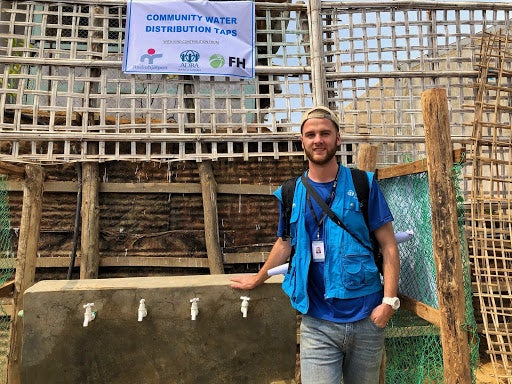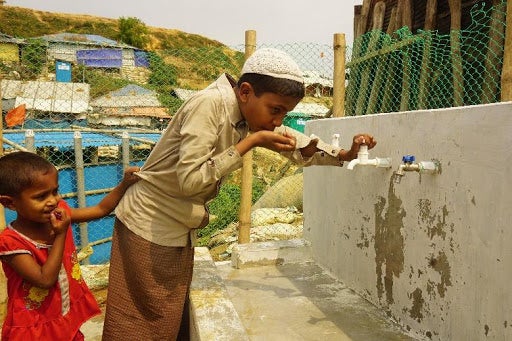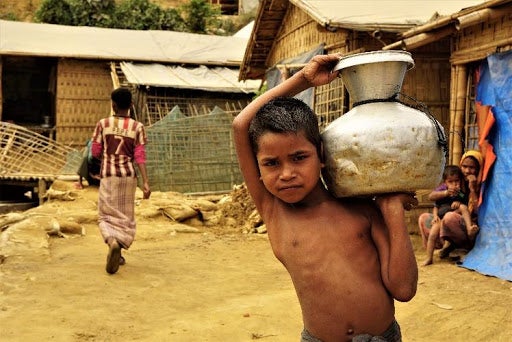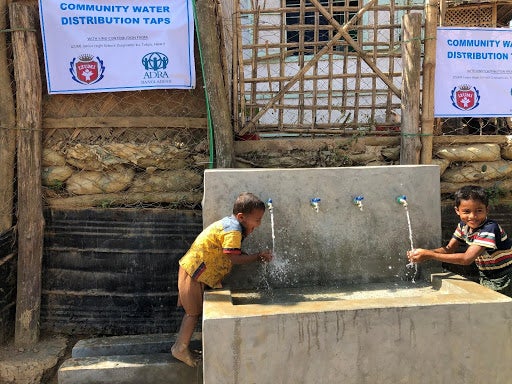Angus Pollard, Multidisciplinary Studies Program
Like many college students, Angus Pollard started off pursuing one major and switching to another and then deciding to change again. With almost one-third of college undergraduate students switching their degrees more than once (U.S. Department of Education), many students are left asking, “How is this degree helping me achieve my goals? Is this really the best path for me?”
This is how Angus’ connection to the Multidisciplinary Studies Program began.

Angus started his degree path as an entrepreneurial management major and completed two years in the program before switching to the social work program and realizing the switch wasn’t compatible with his career goals. After taking a summer internship with a non-governmental organization (NGO) in the Philippines, he realized his passion was nonprofit work. With no sure path forward in a traditional setting, Angus wrote: “I realized there was a middle ground, so to say, between business and social work; I understood that I had uniquely valuable experience to pursue nonprofit management through both the programs I had experienced… and began to explore my options for studying that more directly. I was eventually recommended to reach out to the MDS department, who supported me immediately when hearing [about] my goals and my past experience.”
After graduating with a degree in Multidisciplinary Studies, Angus now works with Adventist Development and Relief Agency, a humanitarian agency that helps with disaster relief and community development. Angus Pollard’s day-to-day is nonprofit management, as he works and lives in areas where NGOs are active.
“I was able to gain valuable nonprofit leadership skills, which I use daily in my career,” Angus wrote. “I am [now] supporting the management of a project in partnership with the United Nations High Commissioner for Refugees on a camp coordination and management project, with our team overseeing four camps in the Rohingya response.”
Read below for more of our interview with Angus and learn more about his thought process, the Multidisciplinary Studies program and how he is applying what he learned.
Angus Q and A
Why did you choose Multidisciplinary Studies?
I came to understand the MDS degree would allow me to combine past academic experience, and tailor my future academic work specifically how I saw fit. I learned quickly about how the MDS degree was well suited for people with life experience, and although I never took a break from education, I gained various life experiences through work and living in both Australia and the Philippines.
I came to Boise as an Entrepreneurial Management major and completed two years on that track. I realized while living in Australia that I was capable and driven to work in a field that I feel is more valuable than business. I switched to social work as I felt that might be the direction I should go, but I made that switch with no guidance, which was my mistake, but a valuable lesson learned. I completed a year in the social work program learning the valuable core information on social work, and during these courses was exposed to several nonprofits in the area and volunteered extensively. Towards the end of that year, however, I realized this degree is more suited for a person aimed at becoming a licensed social worker, a counselor and the like; I realized that this was not what I was meant to do.
I was able to take on an internship that summer in a program support role in the Philippines. Things began to click for me from my exposure to volunteering and the experience with the NGO in the Philippines. I realized there was a middle ground so to say between business and social work, I understood now that I had uniquely valuable experience to pursue nonprofit management through both the programs I had experienced. I had maintained my nonprofit management minor throughout these years and began to explore my options for studying that more directly. I was eventually recommended to reach out to the MDS department, who supported me immediately when hearing my goals and my past experience. The MDS department allowed me to do two things: combine my past experience in a valuable way and to focus my further study on the specific direction I wanted to take.

How did you focus your courses to personalize your degree plan to fit your goals and interests?
I focused my courses to revolve around my nonprofit management minor and wanted specifically to go further in the direction of management. The nonprofit management minor courses were adding valuable nonprofit learning, but I felt it would support the courses well if I added leadership, communication and sociology courses. All the while remaining involved with volunteering through the service-learning component.
Do you feel like Multidisciplinary Studies gave you the flexibility to pursue your goals? In the curriculum? In the delivery methods?
During my studies, I always appreciated the ability to simultaneously take courses in person and online. This allows for more courses throughout a semester while leaving valuable time during the day to volunteer and pursue other activities.
How are you using your degree or what is your next step?
Within two months of graduation, I secured a position at an international NGO, working in disaster relief and development and extreme poverty reduction… Through the MDS program, I was able to gain valuable nonprofit leadership skills, which I use daily in my career.

After joining with Food for the Hungry (FH), I did some time in an entry-level position and was then sent to the field on assignment to work in the Rohingya camps. I became the logistics focal for all of our field operations and then moved into management after my contract ended with FH.
For me, the most rewarding thing I have accomplished in my career since graduating was managing a project for a few months that attempted to provide clean safe drinking water throughout Rohingya health clinics and the surrounding community. Over the course of the project, I managed to implement chlorine-treated, solar-powered clean water. The project was an overall success with clean water reaching upwards of 7,500 beneficiaries every day, mostly women and children. The project filled major gaps in water needs, as well as provided sterile water for use throughout 5 health clinics. The solar power ensured that there was always power available to pump the water, and the taps ensured beneficiaries did not have to use heavy hand pumps to access water.

Now with Adventist Development and Relief Agency, I am supporting the management of a project in partnership with the United Nations High Commissioner for Refugees on a camp coordination and management project, with our team overseeing four camps in the Rohingya response. Our team supports the coordination of the humanitarian response through the camps, supports the local government administration, and manages the site improvement and shelter aspects of our area of responsibility.
There are many students like Angus, who have jumped between fields of study many times before finding the right fit. The Multidisciplinary Studies program is an interdisciplinary degree meant to cater to students with these experiences along with others such as gaps in their college careers, busy schedules due to their career, family obligations or military background. The MDS program builds the bridge between wondering how to make the most of past educational and life experiences to finishing what you started.
About Boise State Online
Check out the Boise State Online Bachelor of Arts in Multidisciplinary Studies and learn how you can finish your degree. Along with the MDS program, Boise State University offers more than 55 online degree and certificate programs to help you make your educational dreams a reality–whether you need a bachelor’s degree, a graduate degree or a single, online class. For more information, visit boisestate.edu/online.